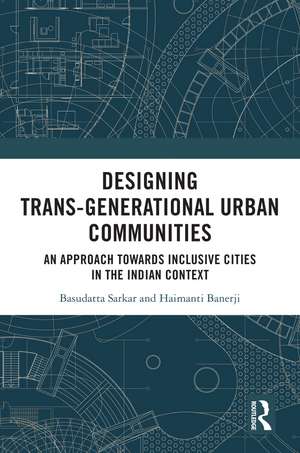Designing Trans-Generational Urban Communities: An Approach towards Inclusive Cities in the Indian Context
Autor Basudatta Sarkar, Haimanti Banerjien Limba Engleză Hardback – 14 iun 2024
Offering rich empirical research, this book will be useful for students, teachers and researchers of architecture, urban design, urban geography, urban studies, urban development and planning, and child psychology. It will also be of interest to urban planners and designers, policy planners, local government authorities and professionals engaged in the discipline.
Preț: 1000.27 lei
Preț vechi: 1219.84 lei
-18% Nou
Puncte Express: 1500
Preț estimativ în valută:
191.42€ • 198.64$ • 159.100£
191.42€ • 198.64$ • 159.100£
Carte tipărită la comandă
Livrare economică 17-31 martie
Preluare comenzi: 021 569.72.76
Specificații
ISBN-13: 9781032345444
ISBN-10: 1032345446
Pagini: 160
Ilustrații: 50
Dimensiuni: 156 x 234 x 13 mm
Greutate: 0.45 kg
Ediția:1
Editura: Taylor & Francis
Colecția Routledge India
Locul publicării:Oxford, United Kingdom
ISBN-10: 1032345446
Pagini: 160
Ilustrații: 50
Dimensiuni: 156 x 234 x 13 mm
Greutate: 0.45 kg
Ediția:1
Editura: Taylor & Francis
Colecția Routledge India
Locul publicării:Oxford, United Kingdom
Public țintă
PostgraduateCuprins
1. Introduction- Toward a Better Understanding of Vulnerable Population in Cities, Context, Issues, Challenges and Need for Inclusion 2. Background, Theory and Development: A Critical Review of Theories, Guidelines, Norms and Planning Standards 3. Issues and Priorities of Target Groups: A User Sensitive Approach 4. Analysis and Synthesis 5. A Manifesto for Change: Policies and Guidelines for Designing Trans-generational Urban Communities and Cities (TGUCC) 6. Annexures
Notă biografică
Basudatta Sarkar is an architect-planner and academician presently teaching at National Institute of Technology Rourkela as an Assistant Professor in the Department of Planning and Architecture. She has completed her doctoral research from Indian Institute of Technology Kharagpur in 2016. Her areas of interest include vulnerability assessment; age sensitive and gender sensitive neighbourhood; green infrastructure and impact assessment of social ties in Micro, Small and Medium Scale Enterpries (MSME).
Haimanti Banerji, is a Professor in the Department of Architecture and Regional Planning and the Associate Dean of Continuing Education and Outreach at IIT Kharagpur. She has more than 19 years of working experience with the vulnerable groups in urban Indian context. She is one of the authors of Universal Design India Principles © NID, 2011. Her recent contribution towards mainstreaming inclusion in the domain of urban planning and development is the Inclusive City Framework and revision of URDPFI guidelines, and preparation of online courses and toolkits for professional along with UN-Habitat and NIUA. Dr. Banerji is also actively involved in the Global Housing Technology Challenge (GHTC), an initiative by Govt. of India to provide ‘Housing for All’ in various capacities. Her recent international academic collaborations include Indiana Univ. of Pennsylvania and MIT, USA.
Haimanti Banerji, is a Professor in the Department of Architecture and Regional Planning and the Associate Dean of Continuing Education and Outreach at IIT Kharagpur. She has more than 19 years of working experience with the vulnerable groups in urban Indian context. She is one of the authors of Universal Design India Principles © NID, 2011. Her recent contribution towards mainstreaming inclusion in the domain of urban planning and development is the Inclusive City Framework and revision of URDPFI guidelines, and preparation of online courses and toolkits for professional along with UN-Habitat and NIUA. Dr. Banerji is also actively involved in the Global Housing Technology Challenge (GHTC), an initiative by Govt. of India to provide ‘Housing for All’ in various capacities. Her recent international academic collaborations include Indiana Univ. of Pennsylvania and MIT, USA.
Descriere
This book examines the inclusiveness of city planning and design to address gaps in policies, strategies and design guidelines for developing trans-generational urban communities in India.
